
More Examples of Psychological Reactions to Detox & the IUD


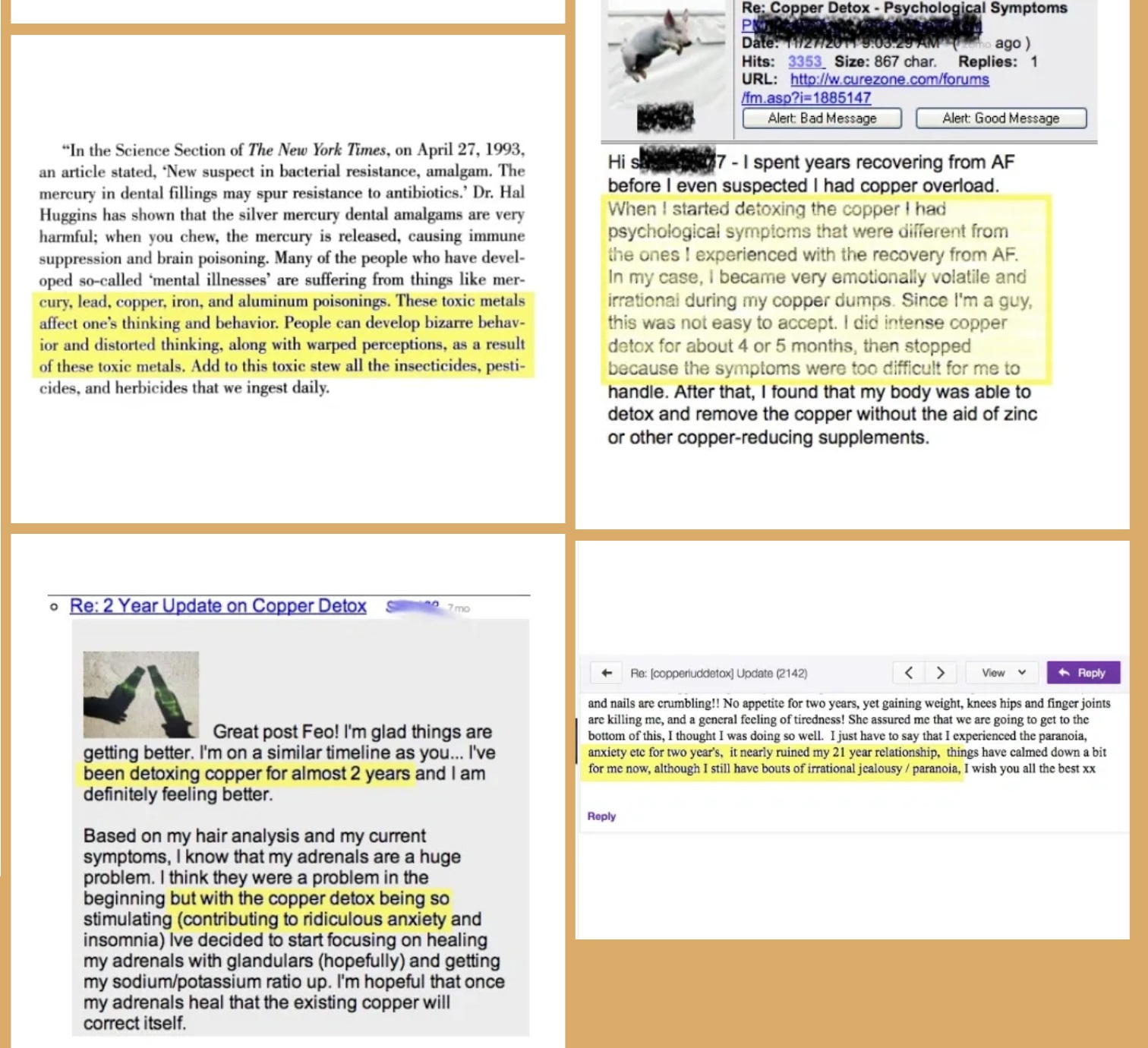
Excess copper accumulation lowers nutrients needed for serotonin production, can lead to the emotional numbing effect of the "calcium shell", and can increase anxiety and panic reactions - especially when being mobilized into circulation.
As such, copper toxicity can be a major underlying catalyst of relationship problems / withdrawal and emotional health changes.
"Copper toxicity often leads to the destruction of relationships. Sometimes they don't realize it because their feelings are numbed so much by the buildup of excess calcium and copper, they're not even aware that their feelings are numbed, deadened, and cut off, and they're basically operating at a cognitive level and not a feeling level, and yet cognitively they can convince themselves that they're thinking their way through their emotional life. And that's simply not the way it works, psychologically. I would venture to say that divorce courts are loaded with people whose relationships were destroyed by copper toxicity. Because the role of copper toxicity impacting the emotions, thought processes and behaviors is not understood, it leads to a lot of animosity and anger and resentment, and revenge - a lot of flare-ups of the 'Judge' [a state of the ego-mind] psychologically - that ultimately winds up destroying the relationship."
~ Dr. Malter, Ph.D.
"Copper lowers dopamine (a neurotransmitter that controls the brain’s pleasure and reward centers) and increases norepinephrine (another neurotransmitter that also functions as a stress hormone) in the brain. Imbalances in these important neurotransmitters are related to anxiety and panic disorders, depression (especially postpartum), bipolar disorder, ADHD, autism, violence, and paranoid schizophrenia."
~Dr. William J. Walsh, PhD,
Author of 'Nutrient Power: Heal Your Biochemistry & Heal Your Brain'
Women have been told for years that there’s no such thing as copper toxicity, and that their copper IUD can’t possibly contribute to mood symptoms since it’s non-hormonal. However, not only does copper influence hormone levels, but it also has direct implications on one’s mood and emotions.
Excess copper accumulation can lower nutrients needed for GABA production (ie: B6 and magnesium); it can lead to the emotional numbing effect of what’s known as a "calcium shell"; and it can cause increased anxiety and panic reactions - especially when excess copper gets mobilized into circulation. As such, copper toxicity is often a major catalyst behind emotional health changes as well as relationship problems and withdrawal.
Copper, at a healthy level, helps in the release of endorphins that contribute to normal feelings of love and euphoria. Ancient cultures made this connection, and some manufacturers today of copper products use these concepts as a benefit in their marketing, calling copper a 'love mineral'. Part of this connection dates back to ancient times and copper’s association with the goddess of love, Venus. However, remember that copper has two sides to the coin, and while on the one hand (at a healthy level) it can support healthy emotions, with toxicity the emotional benefits reverse.
The higher the bio-unavailable copper level becomes, especially when compounded with adrenal exhaustion, the more that feelings of love can become diminished and numbed, while risk for depression, anxiety, irritability, and even violence increases. Important memories may also be affected (due to zinc's effect on the hippocampus), with recall ability impaired. Excess copper indeed affects the emotions, but not always in a loving way that’s often misinterpreted by the connotation of copper being an 'emotional mineral'. Even a quick glance at the cases shared at www.coppertoxic.com/cases-stories speaks powerfully to the toll that copper toxicity can have on emotions and relationships.
The dichotomic emotional effect of copper is perfectly summarized in the book 'Energy: How it affects your emotions, your level of achievement, and your entire well-being'. An excerpt from this book discussing the destructive role that copper toxicity and adrenal burnout play in relationships is provided on the Energy page of this site.
While it's true that copper can increase the 'emotional states' of humans, this should not automatically be assumed to refer to feelings of love and positivity. Emotions also include depression, anxiety, fear, anger, resentment, etc. Research, along with first-hand anecdotal evidence, shows that high levels of bio-unavailable copper trigger those negative emotional states while at the same time deadening positive feelings of love.
THESE 'EMOTIONAL' EXPERIENCES CAN BE FULLY SEEN IN THESE CASES AND STORIES.
Copper is also a key factor in PMS symptoms. As estrogen rises during the premenstrual cycle (or during pregnancy), copper tends to rise. This leads into zinc deficiency during the luteal phase (when PMS symptoms occur). Meanwhile, calming nutrients which can ease PMS symptoms (zinc, magnesium, and B6) are reduced as copper increases.
With the drop in the zinc level as copper increases, so too drops the level of NGF (nerve growth factor). Elevated NGF plays an important role in early-stage romantic love (first 1-6 months of a relationship)[1]. Copper toxicity occurring to a partner during this early relationship phase can really play havoc as heightening copper lowers zinc and in turn NGF, potentially suffocating those feelings of love.
"Copper toxicity has been observed in association with major psychological problems including hyperactivity,depression, attention deficit disorder,memory problems, anxiety and panic attacks, violence, and emotional deadness.
~J.Casper, L.Ac
"Anyone who becomes highly copper toxic will begin to experience a deadening of his/her feelings."
~from 'The Strands of Health', by Dr. Rick Malter, PhD.
'
Though copper mostly accumulates in the liver initially, once the liver is overburdened, copper then gets stored in secondary locations, including the brain. Copper stimulates the diencephalon or old 'emotional' brain (the part of the brain based on quick emotional decisions such as anger, fight/flight, and avoidance). Zinc, on the other hand, is needed for the new brain (cortex) - the brain associated with the “higher emotions” such as reasoning, compassion and love. As zinc drops and copper rises, these higher emotions are weakened and the person tends to revert to using the old brain - triggering more of the negative emotions and behaviors.
Additionally, copper is largely deposited in the limbic brain which contains the hippocampus (affecting memories and emotions) - the cells of which have been shown to die when deprived of zinc.
Microglial activation also occurs. Microglial activation refers to the process in which microglia, the resident immune cells in the central nervous system, become activated and undergo changes in response to various stimuli or injuries. Microglial activation can have either beneficial or detrimental effects on brain health, depending on the context and extent of activation. Microglia can sometimes provide anti-inflammatory activity, but they can also produce pro-inflammatory cytokines. Copper, along with other toxic metals, can trigger this microglial activation in the brain. This results in brain inflammation and, in turn, decreased cognition and increased anxiety and depression.
“In the central nervous system (CNS), extracellular copper accumulation triggers pathological microglial activation and subsequent neurotoxicity.” [2]
“Copper toxicity is a very common mineral imbalance associated with feelings of depression. This type of depression is often accompanied by excessive emotions of many types such as anger, rage, frustration and others.” ~ Wendy Myers
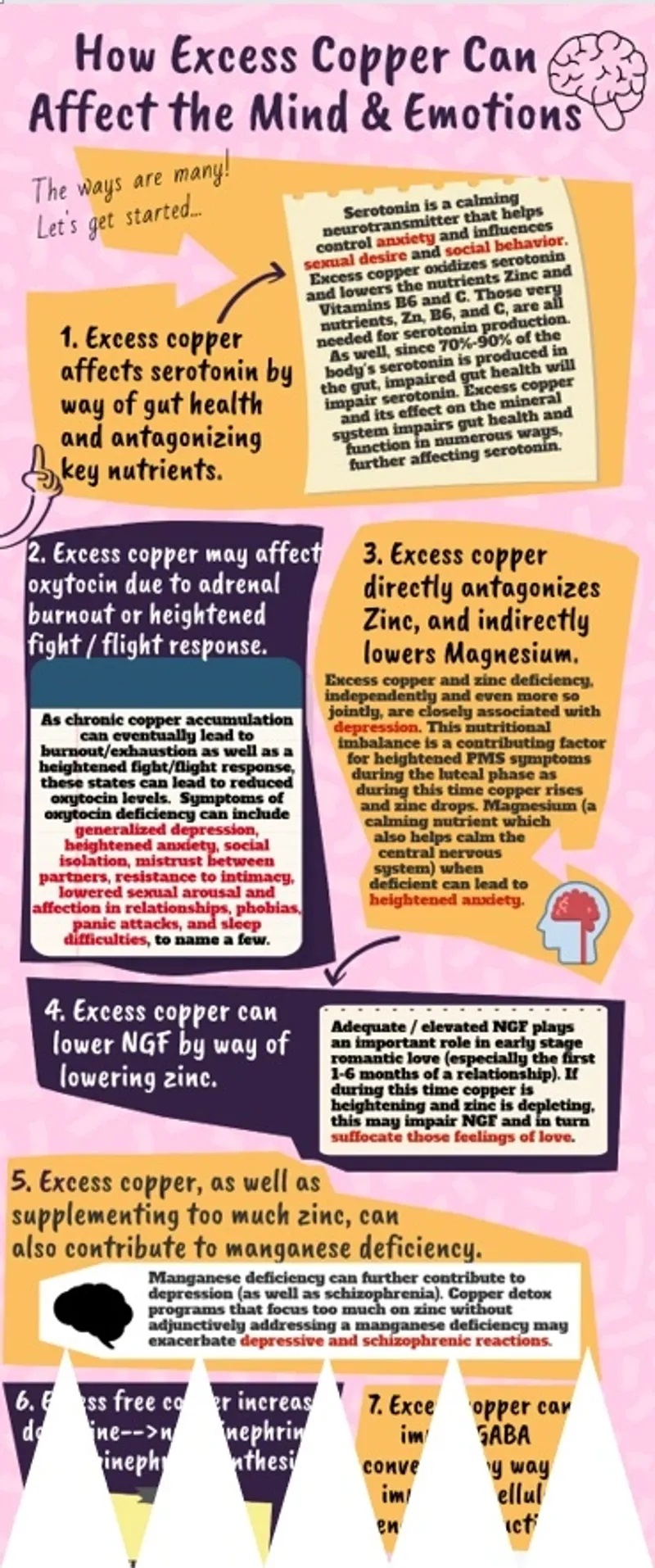
"Mental diseases and symptoms linked to high inorganic copper levels are low-histamine schizophrenia, postpartum psychosis, depression, senility, autism and hyperactivity. Paranoia and hallucinations are prevalent in younger schizophrenics and depression in older ones." [3]
"An adequate copper level is what gives a woman her 'warmth'. Copper is involved with the production of estrogens - the female hormone. Women who lack 'AVAILABLE' copper tend to be cold and sometimes either secretly or openly hostile to men."
~ Chatsworth & Eck
"Excess copper in the system can cause paranoia."
~Gabriel Cousens M.D., M.D.(H.), N.D.(h.c.), D.D.
----------
"The present data indicate that serum copper is a 'trait marker' of unipolar depression." [4]
"Sequentially, you get higher and higher and higher levels of copper concentration, which now will affect brain capacity, processing, and thinking and make anxiety and depression worse. This is what we see in post-partum depression and in post-partum psychosis. Many times, you hear the stories about women who have shot their husbands and drowned their children, et cetera. If you notice, most of these women have had multiple children, usually three to four, sometimes even five, before these events have occurred. These women were copper-toxic females who could not get rid of copper, it affected their brain functioning, their nerve-conduction and in actuality caused a huge electrical short-circuiting of mental processes. We’d be amazed at the knowledge of how many individuals who are in prison systems are there really because of a poor detoxification process involving copper."
~Dr. Albert Mensah
(on emotional impairment in those using oral contraceptives (OC) [which raise Cu])
"It is noteworthy that women with OC use showed the most pronounced impairments in emotion recognition during the processing of expressions that were difficult to recognize...Women with OC use were less accurate in emotion recognition than women without OC use. The ability to recognize others’ emotional expressions is essential for the initiation and maintenance of interpersonal relationships, in particular intimate ones (Schmidt and Cohn, 2001). As an inaccurate recognition of others’ emotional expressions may lead to interpersonal conflicts...[5]
"...as a person's stress level increases and intensifies, s/he is more likely to develop a calcium shell, especially if s/he is in a constant highly stressful situation," [ie: demanding job, intense academic pressure...] "This is because, under stress, a person tends to lose magnesium and zinc from their cells and tissues. As magnesium is lost from cell and tissue storage, more soft tissue calcification is likely to occur and the Cal/Mg ratio will increase. These mineral changes lead to increased muscle tension, more unstable blood sugar levels, diminished awareness of one's feelings, and lower energy levels. Depression and anxiety may also increase in frequency and intensity. Since zinc antagonizes copper, a drop in zinc allows copper and calcium to increase even more."
~'The Strands of Health', Dr. Rick Malter, Ph.D
Neurotransmitter Connections
As copper plays a role in MAO-A and MAO-B enzymes (these enzymes in turn affect serotonin, adrenaline, dopamine, tryptamine, noradrenaline, melatonin etc...) copper therefore plays an important role in brain health and neurotransmitters, all of which further influences emotions and behavior.
We could look at serotonin for example. Serotonin is a calming neurotransmitter and may help control anxiety. Serotonin receptors seem to be directly involved in the normal function of the hippocampus in mood regulation and memory formation. Serotonin also influences sexual desire and some social behavior. One of the problems is that copper oxidizes serotonin and impairs it from doing its job. This is not to oversimplify things by suggesting that one just needs to raise serotonin (after all that’s the ideology used to promote SSRI medications). Trying to raise serotonin can actually backfire, especially if serotonin goes too high. There is certainly much more to depression than just issues with serotonin,. However, the connection should not be discounted entirely. Zinc, Vitamin B6 and Vitamin C are all essential for serotonin production, yet all three of these nutrients are reduced in the presence of excess copper.
Consider the link between depression and low zinc:
A meta-analysis published in December 2013 in Biological Psychiatry analyzed 17 studies and found that depressed people tended to have about 14 percent less zinc in their blood than most people do on average, and the deficiency was greater among those with more severe depression.' [6]
Much more important than serotonin is GABA. Gamma Amino Butyric Acid is the body’s main inhibitory neurotransmitter, helping to maintain calm and relaxation - balancing against glutamate (the body’s main excitatory neurotransmitter). In other words, too much glutamate over GABA can lead to anxiety, racing mind, OCD, depression, worry, poor focus, etc. Excess copper, by way of slowing the thyroid and impairing cellular energy production, along with negative impacts on Vitamin B6 and magnesium, inhibits the conversion of glutamate into glutamine and GABA, resulting in high glutamate levels. This in turn contributes to copper's excitotoxicity effect along with symptoms such as impaired speech, high irritability, anxiety, aggressiveness, GI inflammation, and neuronal destruction. It could be noted that depression has long been associated with deficiencies in serotonin, dopamine, and GABA ...all of which are impacted by excess copper.
If we look at excess copper’s basic effect on key neurotransmitters, and we look at some of the well-recognized emotional impacts of those neurotransmitter imbalances, it’s not hard to see how important this copper connection is in addressing mental health. This is not to imply that all problems stem from copper, absolutely and of course not. However, the connection should at least be considered.
On top of all this, high copper can also lead into a state known as the 'calcium shell'. This large rise in tissue calcium is a defense mechanism against increasing and overwhelming stress, effectively reducing the adrenal response while creating an emotional buffer.
"It is well understood that neurotransmitters play a role in psychiatric conditions... when copper is elevated, dopamine levels decrease and norepinephrine levels rise. Having these neurotransmitters out of balance can result in a whole range of problems including anxiety, panic, paranoid schizophrenia, bipolar disorder, depression, ADHD, and autism."
~Courtney Snyder, MD, Psychiatrist
"Copper also affects neurotransmitter production. It actually pushes the conversion of dopamine, that lovely, warm, fuzzy feeling neurotransmitter into that excited neurotransmitter, norepinephrine. So, all that norepinephrine cause the heart to race, it can cause anxiety, it can later cause depression and it can later cause adrenal fatigue."
~Dr. Albert Mensah
"The main hormone that mediates stress response is cortisol which is directly toxic to nerve cells in the part of the brain (the hippocampus) that mediates memory and emotion - it kills them."
~ Dr. Andrew Weil
"Copper and zinc are regarded as neurotransmitters and are in high concentrations in brain hippocampus. As a result, elevated copper and depressed zinc have been associated with hyperactivity, attention deficit disorders, behavior disorders, and depression. Also, many of those labeled with autism and paranoid schizophrenia have elevated blood copper levels in addition to other biochemical imbalances."
Jeremy E. Kaslow, MD
Without an understanding of how and why these psychological changes occur, a person no matter how mindful, a relationship no matter how loving, can be derailed, or taken out. When the emotional state is altered (by all the ways explained above), the person is then operating more from states of fear, anxiety, depression or panic. The mind accepts, believes, and surrenders to those thoughts, and a new storyline is created. The storyline can be amplified further depending on past programs and/or whether the calcium shell is present.
"I could see in myself the severity of my moods, Jekyll and Hyde, but occasionally glimpses appeared of the happy fun person I was, but it too, was forced. Arguments between my husband and I became unbearable.. He told me certain things that in my mind I thought he was saying out of spite and to hurt me...I'd become defensive, angry and honestly believed that he was trying to make me crazy because he resented me being sick all the time.. I completely shut down my feelings towards him, as after 13 years together I thought this was just the path of the relationship. And many times was "ready" to let go of the relationship. How can something like copper toxicity make me feel so shut off and take all logic out of the equation?" ~M.A.
Such experiences as above are extremely common. It's heartbreaking to read some of many cases and stories here, with very few of these women ever being counseled by their practitioner on the damaging role that excess copper (or the copper IUD) can have on relationships. Even independent of each other, copper toxicity and adrenal burnout both individually can lead at more advanced stages to withdrawal, apathy, irritability, anxiety, memory problems, and depression. When both are experienced together, the results are amplified, and it can be devastating on relationships. The highly copper toxic individual shuts down emotionally (compounded by the calcium shell, and especially even more so if adrenal burnout occurs). As Dr. Eck explains in the Energy book, "No matter how much they truly love you - when they go into burnout they really want to be independent." Often, the patient is not even aware of what their feelings really are. The lack of energy reduces awareness to the true extent of the problem. In fact, many of the symptoms of copper toxicity at this stage are the same as those commonly seen with adrenal burnout, and the issue is just as much about the burnout as it is with the copper. If both are present, the symptoms can be amplified. It is highly improbable for a person who has experienced adrenal burnout, especially when copper toxicity is also at play, to be acting as one's true self emotionally in the period following burnout. Too many factors are acting together to make a person shut down. This short discussion from the aforementioned 1985 "Energy" book provides an excellent starting point in understanding the relationship withdrawal commonly occurs during adrenal burnout. The effects of copper and the calcium shell then add to this withdrawal.
Sexually the person is not only mentally, but also biologically forced to withdraw when burnout occurs - the body is trying to preserve its energy and so the sex hormones, being not as critical, are put on the back burner. It can seem to the patient that they no longer desire their partner, not understanding that this feeling is simply a survival mechanism and not their true self. The closer and more intense the relationship, and the more intense the copper-induced burnout, the more intense the opposing negative withdrawal reaction often is toward that person. Relationship OCD and paranoia become common. Beyond the stories and cases here, forums across the internet (such as this one) are also filled with stories of how the Pill and IUD have devastated relationships. Is it not a tragedy that a product such as the Pill or IUD, designed to bring people closer together, is effectively contributing to tearing those same people apart!
Unless this connection (as described above or in this short clip by Kirby Amour), is properly understood, a person can very easily misinterpret their increasing sexual and emotional withdrawal from their partner (more examples below and here) as a relationship issue, rather than a consequence created by adrenal burnout and the emotional cataract created by heightened copper and calcium.
"In my clinic yesterday a visibly frustrated husband attended with his wife. The wife had come in two weeks earlier and had her hair sample taken so I had her HTMA results in front of me. I sensed the husband was eager to tell me all that was 'wrong' with his wife, the 45 year old mother of his four children. But before he had the chance to speak, I told both of them what the HTMA was showing [image on right]. I explained what the results were indicating and the physical and psychological effects of this profile, namely experiencing a racing mind, mood swings, emotional outbursts, tearfulness and hypersensitivity to criticism. I also described how insomnia was likely to be an issue as were chronic muscular cramps and heart palpitations, not to mention profound fatigue despite the racing mind and anxiety.
They were both stunned and asked how could I know all this from the 'piece of paper' in front of me? And this is where the profound shift took place for the husband, where his frustration dissolved as the penny dropped - his wife was in a state of mineral and thus biochemical chaos. Of course this woman had been on a copper IUD for the past 6 years following the birth of their daughter, and of course, there was ZERO informed consent regarding the side effects of this device which had seemingly devastated this woman's physical and mental health, her marriage teetering on the edge."
(Contributed by: Abdul Saad, Clinical Psychologist)
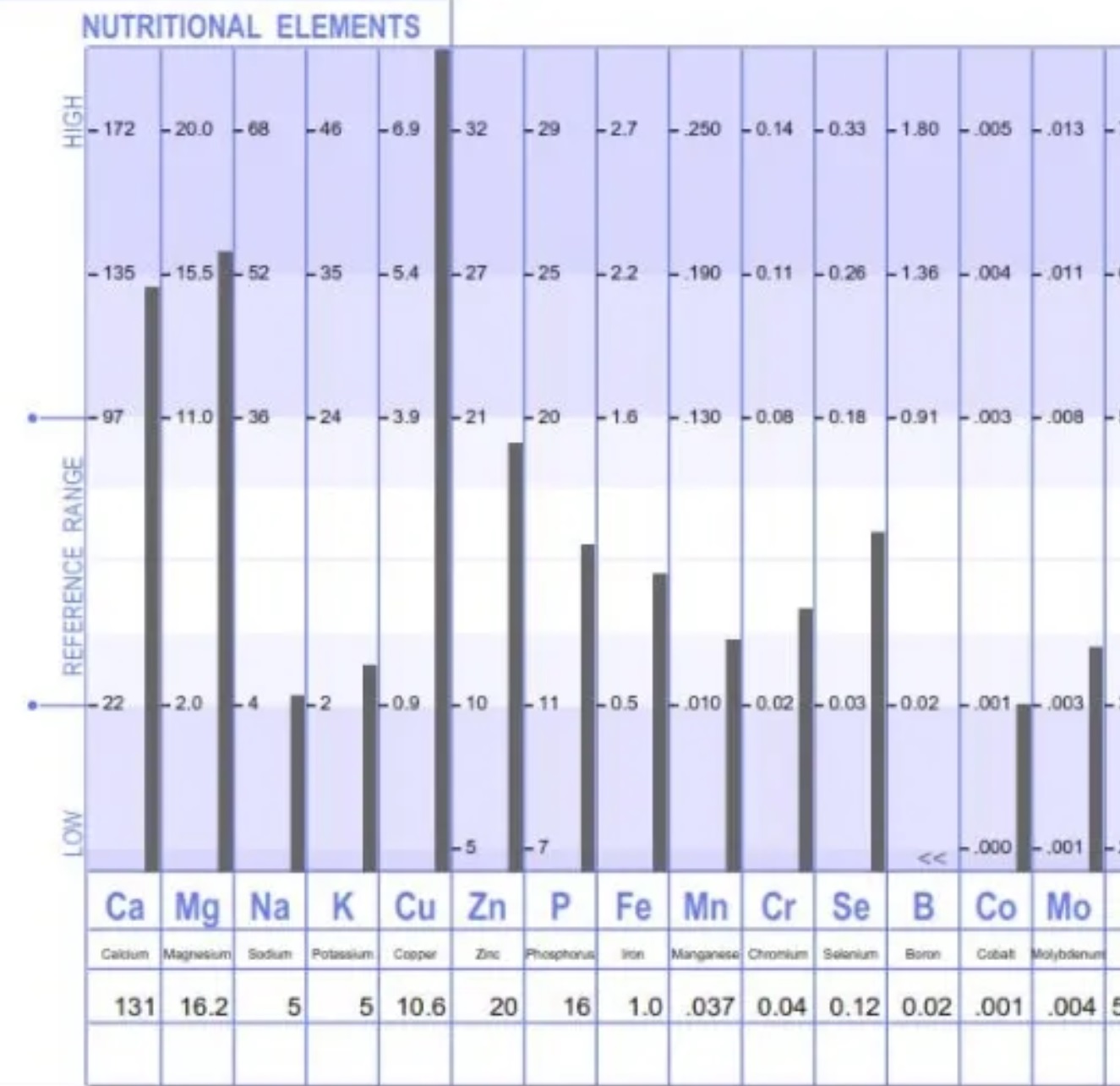
"In Phase C of Adrenal Exhaustion, the body can become extraordinarily sensitive to stressors. Mundane activities may act as triggers in this phase while they normally do not behave as triggers in early stages of Adrenal Fatigue… The first symptoms to show up usually represent the organ system to be turned off first as it is not required for basic survival. Reproduction is considered a luxury and not a vital function when survival is at stake. Libido as a result is lowered. Sex drive becomes non-existence.
~ Dr. Michael Lam, M.D., M.P.H., A.B.A.A.M.,
"Excess copper has also been reported to cause fearful thoughts."
~Dr. Amy Yasko, Ph.D., NHD, AMD, HHP, FAAIM
“Since copper raises the hair and tissue calcium level, women, in particular, with very high copper levels or hidden copper on their hair analyses, often lose interest in sex. Their energy declines and the body can become a bit “numb” because excessive tissue calcium tends to render the nervous system less sensitive.”
~Dr. Lawrence Wilson
"A tired person is fearful, and an exhausted couple is more prone to doubt each other. One partner wonders ‘Will she (or he) always love me as I am?’ and the other is thinking the same. As the fatigue settles in, the joy goes out of being together. You get so tired, you don't want to be touched and you don't enjoy touching - much less lovemaking. You can get so on edge that just the turning of the pages of the daily newspaper or the squeaking of a chair can irritate you. You are so tired you can't enjoy anymore the little kindnesses you used to do for each other. You get too exhausted to even do them, and when totally exhausted, to even care. Apathy replaces joy, and life becomes boring. People start wondering if they really are meant for each other. They wonder what happened to the original feelings that got them together. Fatigue and exhaustion can do all of this and more. It can help destroy a marriage that should have lasted forever."
~ Colin and Loren Chatsworth, with Dr. Paul Eck

Support Healing & Find Peace of Mind!
This guided meditation supports your body's detox ability, calms the anxiety response, and helps remove blocks to healing so you can feel better faster!
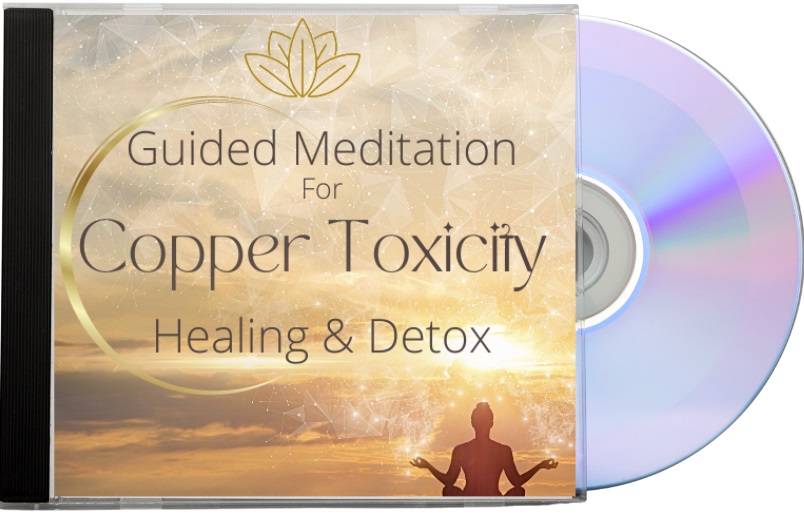




"Many people who have been out of balance for years have been unable to express their negative emotions, such as resentments, fears, anxieties, angers, and hatred. They have stored all of their emotional hostilities and anger in their tissues in the same way that money is stored in a bank. When some people start to improve, many of their hidden repressions and hostilities can come pouring out. This could possibly strain a loving relationship. The best thing to so when this happens to a close loved one is to just let it pass and sit out the storm."
~Eck & Chatsworth (1985 'Energy')
"Copper is one of those bad boys when it is leaving your system....if it’s coming out too quickly. You can indeed control the rate at which elements like copper are removed from the system through detoxification. And that’s extremely important, because believe me, you don’t want somebody or a family member calling you saying, “What did you do to my wife? She is not the same person and…” I’ve had that happen before. So we have to be very careful."
~Dr. Albert Mensah
“Can a HTMA save a marriage? Yes, it can. When it exposes the ravages of copper toxicity, stress overwhelm and rampant magnesium loss, you better believe it can save a marriage. When minerals are being brought back into balance, when NMDA receptor hyperactivity is being quelled, when the amygdala is no longer on rapid fire ready to pounce at the slightest provocation, when the blood sugar roller coaster is levelling out, a person can begin to express their virtues instead of their vices. A person can regain their composure as well as their dignity instead of remaining a wrecking ball. Anything which interferes with the mineral system of the body also interferes with its psycho-spiritual system.”
~Abdul Saad, BSc (Hons), MPsych (Clin)
The article to the right was written back in 1995 by Registered Dietician Renee Nataro who, through hTMA research, quickly came to understand the characteristics of copper toxic individuals. The characteristics she describes are common when copper is mobilized ('dumped') too quickly causing the Na/K stress ratio to rise, as well as the pseudo-inversion of Na/K that reflects the intracellular loss of potassium that can also occur during an intense copper dump.
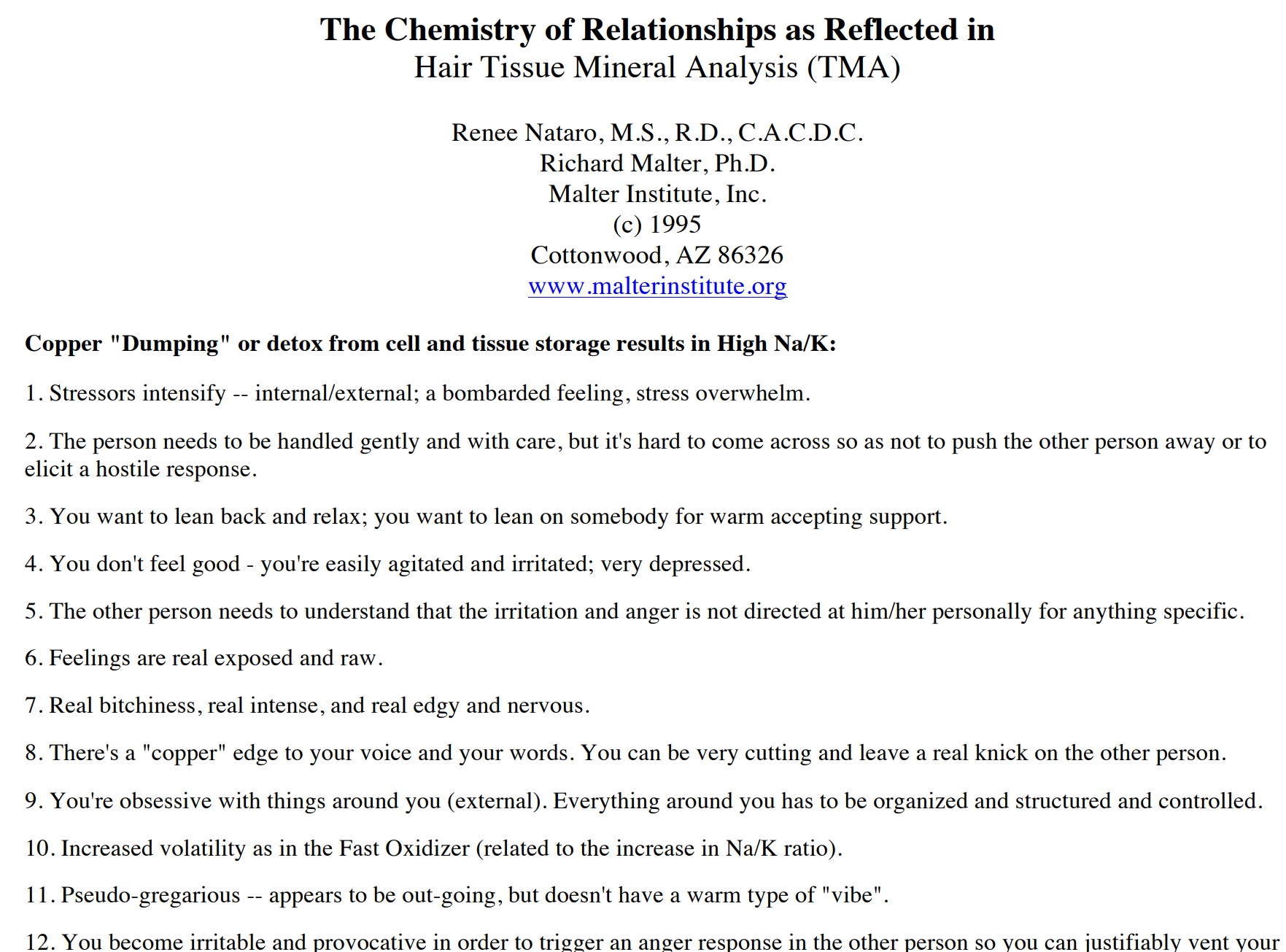

Dr. Rick Malter, PhD, Licensed Nutritionist and Clinical Psychologist (retired), explains the copper toxicity epidemic that he has been seeing developing over his 4 decades in practice - and its implications on energy, emotions, relationships, and society as a whole.
Access all the Copper Toxicity Content
Learn all about copper toxicity with 'The Complete Copper Toxicity Handbook',
providing all the content on this site, and so much more...
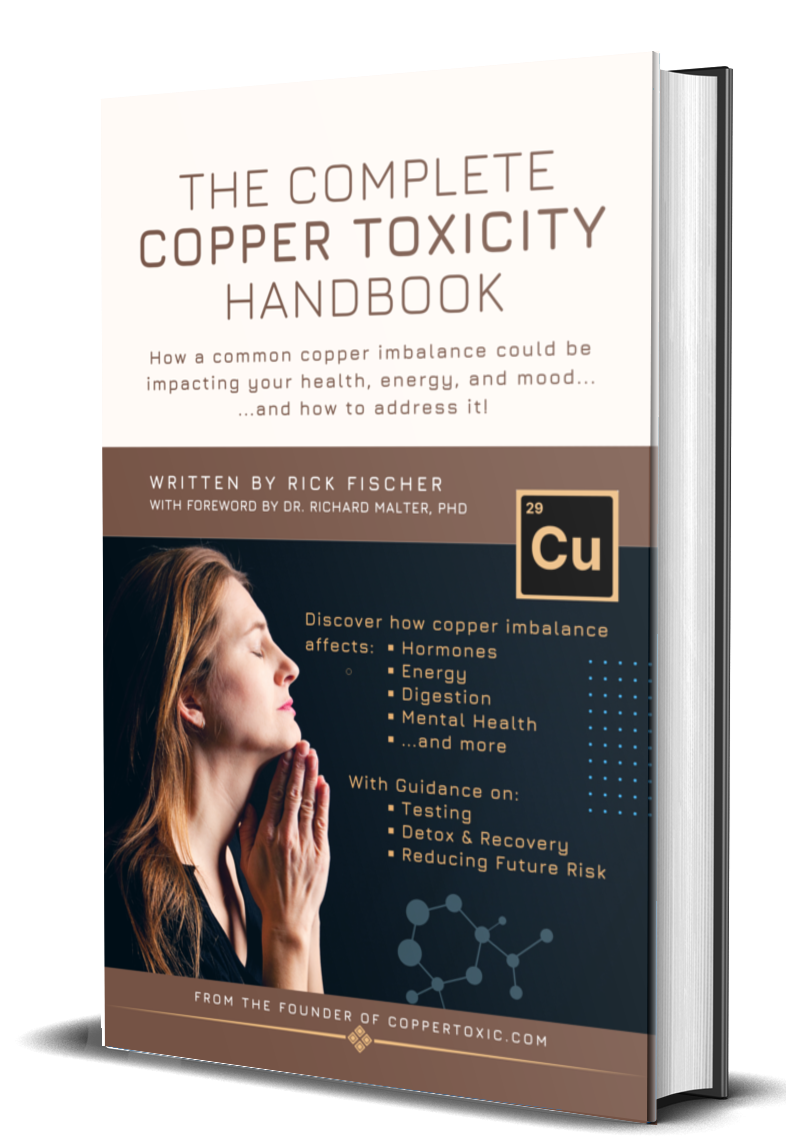
_________________________
References on this Page:
[1] Emanuele, E. (2011). NGF and romantic love. Archives Italiennes de Biologie, 149(2). https://doi.org/10.4449/aib.v149i2.1367
[2] Dong, J., Wang, X., Xu, C., Gao, M., Wang, S., Zhang, J., Tong, H., Wang, L., Han, Y., Cheng, N., & Han, Y. (2021). Inhibiting NLRP3 inflammasome activation prevents copper-induced neuropathology in a murine model of Wilson’s disease. Cell Death & Disease, 12(1), 1–12. https://doi.org/10.1038/s41419-021-03397-1
[3] http://www.health-science-spirit.com/mentaldisease.html
[4] Schlegel-Zawadzka, Małgorzata & Zieba, A & Dudek, D & Zak-Knapik, J & Nowak, Gabriel. (1999). Is serum Cu a “trait marker” of unipolar depression? A preliminary clinical study. Polish journal of pharmacology. 51. 535-8.
[5] Pahnke, R., Mau-Moeller, A., Junge, M., Wendt, J., Weymar, M., Hamm, A. O., & Lischke, A. (2019). Oral contraceptives impair complex emotion recognition in healthy women. Frontiers in Neuroscience, 12. https://doi.org/10.3389/fnins.2018.01041
[6] Rodriguez, T. (n.d.). Metals and mental health. Scientific American. https://www.scientificamerican.com/article/metals-and-mental-health/
TOGETHER...WE CAN INCREASE AWARENESS AND MAKE A DIFFERENCE
© Copyright © 2014-2026 CopperToxic.com - All Rights Reserved.
Reproduction and distribution of material on this website without written permission or clear and proper attribution is strictly prohibited.